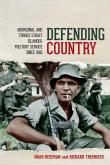 8106278963402681632.jpg
8106278963402681632.jpg
 Defending Country : Aboriginal and Torres Strait Islander Military Service since 1945
multi chapter work
Defending Country : Aboriginal and Torres Strait Islander Military Service since 1945
multi chapter work
 8106278963402681632.jpg
8106278963402681632.jpg
 Defending Country : Aboriginal and Torres Strait Islander Military Service since 1945
multi chapter work
Defending Country : Aboriginal and Torres Strait Islander Military Service since 1945
multi chapter work
'Few Australian realise the extent of Aboriginal and Torres Strait Islander participation in the military. Many enlisted before they had the right to vote, to drink alcohol or even to receive equal wages.
'Defending Country is the first book to document the unique experiences of Indigenous Australian men and women since the Second World War. Using compelling personal narratives and rigorous archival research, it explores how military service impacted the lives of Aboriginal and Torres Strait Islander recruits. It also reveals how their involvement in Australia's defence contributed to the advancement of Indigenous rights.
'Historians Noah Riseman and Richard Trembath examine what motivated Indigenous people to sign up, their experiences of racism in the armed forces, the challenges in returning to civilian life and the role of the Australian Defence Force in promoting Reconciliation.
'Defending Country is an important addition to Australia's military history studies and offers a fascinating insight into little-known wartime experiences.' (Publication summary)
'Human memory, it would seem, can prove seriously deficient when it comes to remembering the contribution made by Indigenous peoples to white men’s wars. In Australia, as the authors of this volume argue, much has been forgotten: Indigenous participation in World War I has become ‘a forgotten memory’ (9), Korea has become the ‘Forgotten War’ (26), while the stories of Aboriginal and Torres Strait Islander veterans of the Vietnam War, ignored altogether during the campaign for Aboriginal rights, have likewise subsequently been ‘forgotten by the majority of Australians’ (92). Through painstaking archival research and revealing personal testimony, this book goes a long way towards bringing this neglected aspect of Australian Indigenous history to our attention.' (Introduction)
'Human memory, it would seem, can prove seriously deficient when it comes to remembering the contribution made by Indigenous peoples to white men’s wars. In Australia, as the authors of this volume argue, much has been forgotten: Indigenous participation in World War I has become ‘a forgotten memory’ (9), Korea has become the ‘Forgotten War’ (26), while the stories of Aboriginal and Torres Strait Islander veterans of the Vietnam War, ignored altogether during the campaign for Aboriginal rights, have likewise subsequently been ‘forgotten by the majority of Australians’ (92). Through painstaking archival research and revealing personal testimony, this book goes a long way towards bringing this neglected aspect of Australian Indigenous history to our attention.' (Introduction)